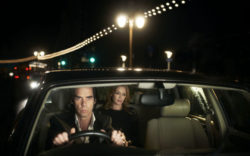WE NEED TO TALK ABOUT KEVIN (R) In the aftermath of a high school massacre carried out by her teenage son Kevin (Ezra Miller), Eva Khatchadourian (Tilda Swinton) grapples with her role in his upbringing, her feelings of intense unease toward him and her tremendous guilt in being the mother of a sociopath.
We need to talk about Lynne Ramsay. With only three feature films—Ratcatcher, Morvern Callar and now We Need to Talk About Kevin—director Ramsay has solidified her place as one of our finest stylists and built on the promise of her debut by trusting in the power of images and sound to deliver layers of narrative complexity instead of designating that role to dialogue. She thinks cinematically but also like a painter or a musician, abandoning the literary crutches of clunky exposition and instead relying on pop music (frequently used ironically), slow editing rhythms and visual texture to insinuate us into the emotional terrain of the characters. Ramsay trusts us to engage with the frame, unafraid to untether us from the obligations of plot. She uses color (specifically garish red) symbolically and as deftly as Antonioni did in Red Desert, Bergman in Cries and Whispers and Argento in Suspiria, constantly reminding us of the massacre at the high school via Eva’s subjective memories. This overheated use of color could’ve been handled preposterously and merely for superficial stimulation, but much of the film’s key emotional power is conveyed through this heightened realism, courtesy of cinematographer Seamus McGarvey, and it’s an important psychological element, considering no actual carnage is ever portrayed on screen. Ramsay’s decision not to directly depict such an unfathomable tragedy is also a moral choice, denying the tendrils of exploitation from uprooting the overall seriousness.
For all of the film’s emphasis on mood, however, the basic requirements of commercial storytelling are firmly in place. The script, written by Ramsay and Rory Stewart Kinnear and based on Lionel Shriver’s breakout novel, is tightly structured and riveting in its impressionistic, nonlinear approach. It faithfully and unsentimentally deals with the major themes of the book (nature vs. nurture; idealism vs. pragmatism) and unflinchingly struggles with the simple yet profound questions Eva faces: What does it feel like when a woman is ambivalent about motherhood and feels emotionally disconnected from the child she’s brought into the world, a child she believes is not normal? What does it feel like knowing you birthed a destructive force?
Like what you just read? Support Flagpole by making a donation today. Every dollar you give helps fund our ongoing mission to provide Athens with quality, independent journalism.









